人教版(新课程标准 必修3 Unit 3 The Million Pound Bank Note grammar直接引语与间接引语课件 (共28张PPT)
文档属性
| 名称 | 人教版(新课程标准 必修3 Unit 3 The Million Pound Bank Note grammar直接引语与间接引语课件 (共28张PPT) | 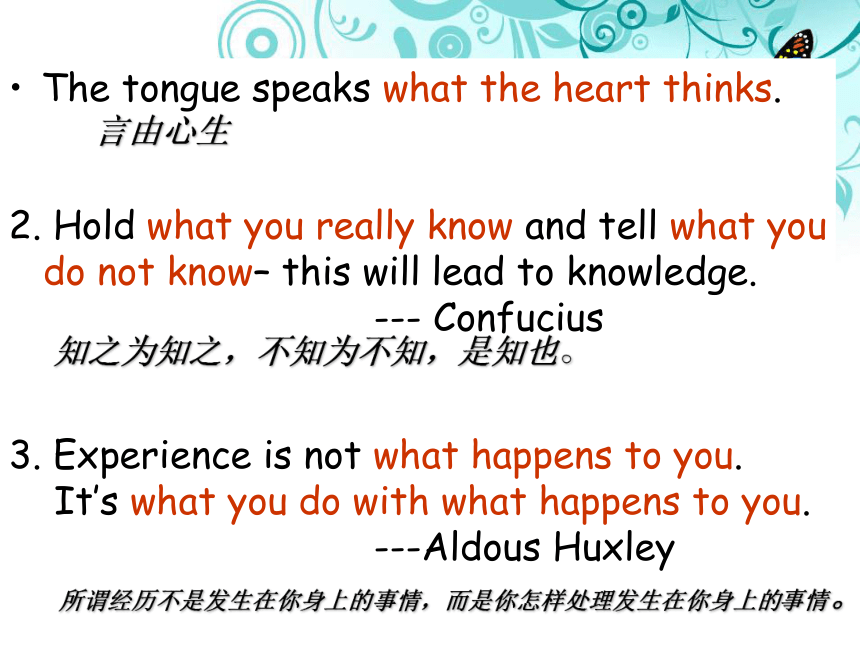 | |
| 格式 | zip | ||
| 文件大小 | 1.1MB | ||
| 资源类型 | 教案 | ||
| 版本资源 | 人教版(新课程标准) | ||
| 科目 | 英语 | ||
| 更新时间 | 2020-06-12 08:18:08 | ||
图片预览

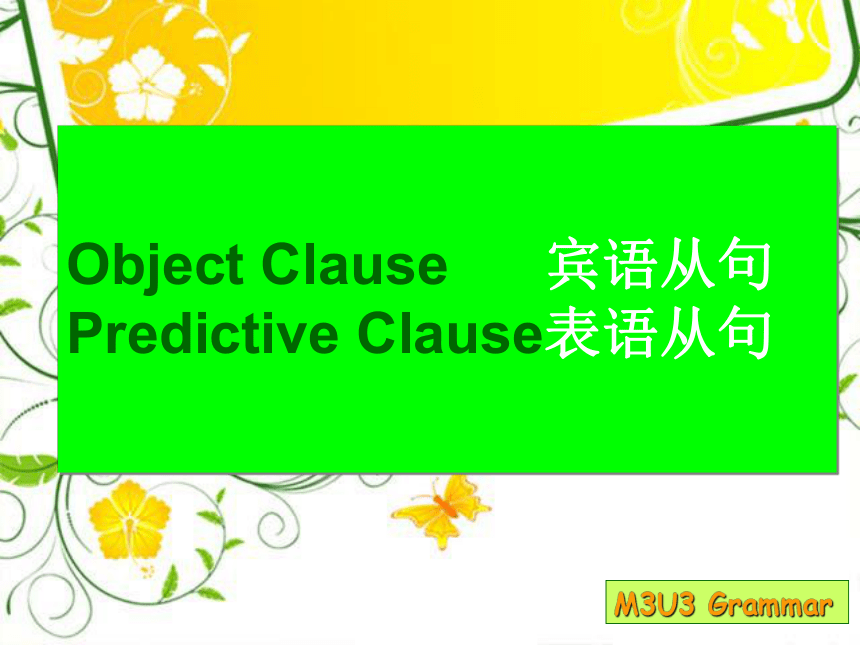
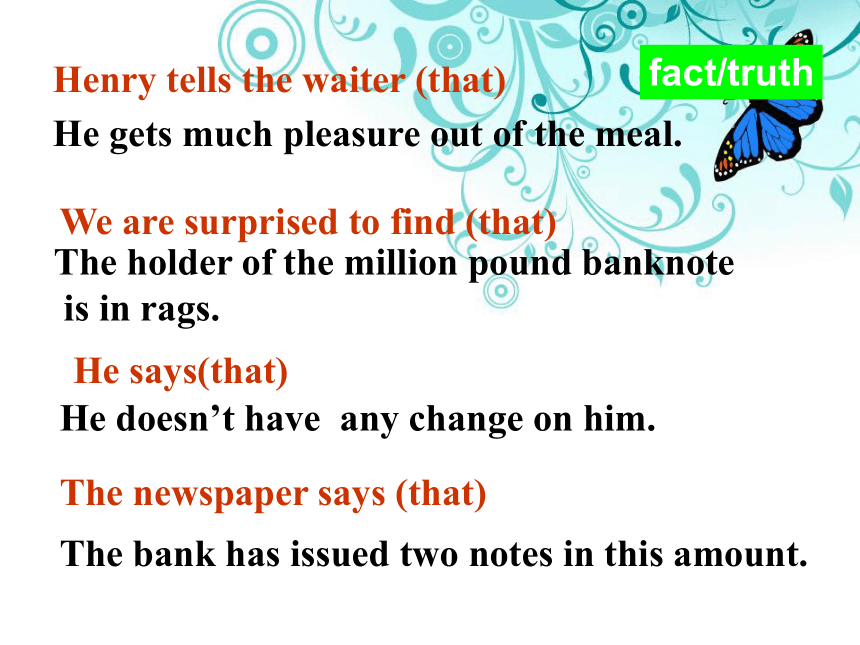
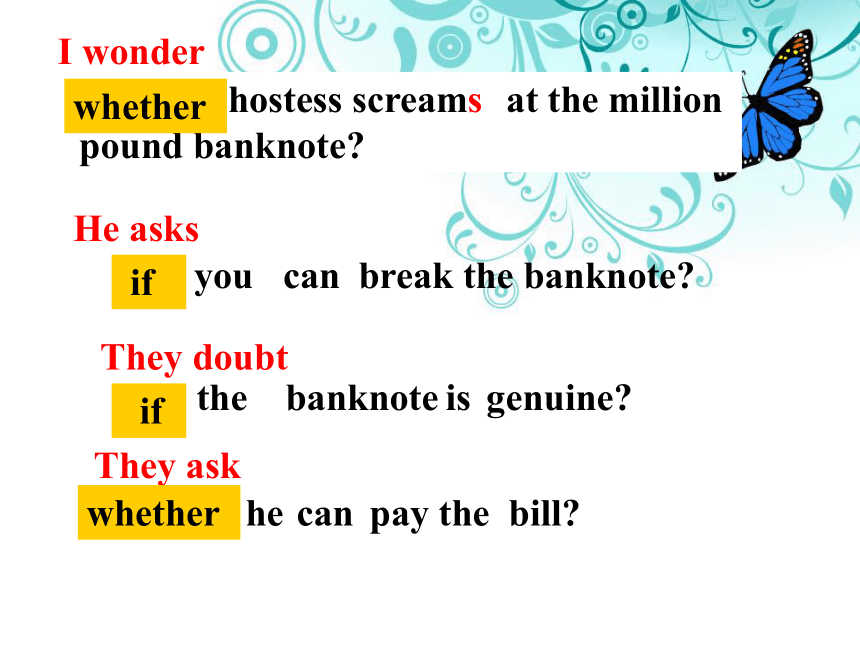
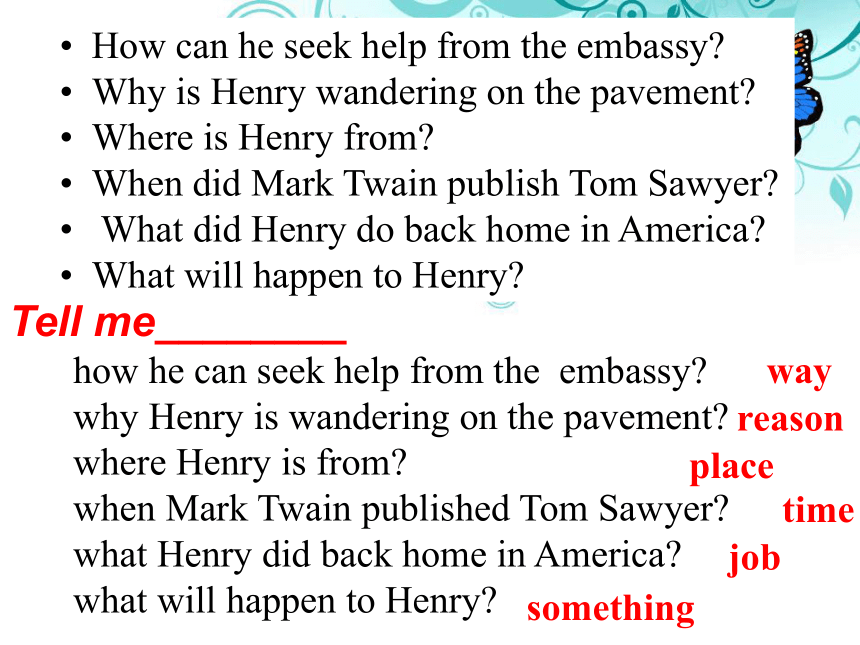
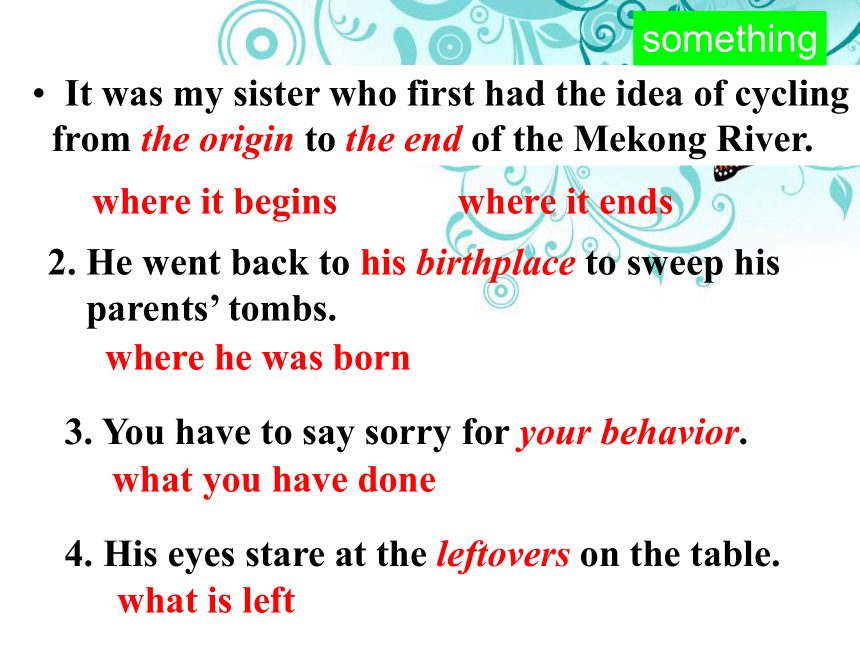
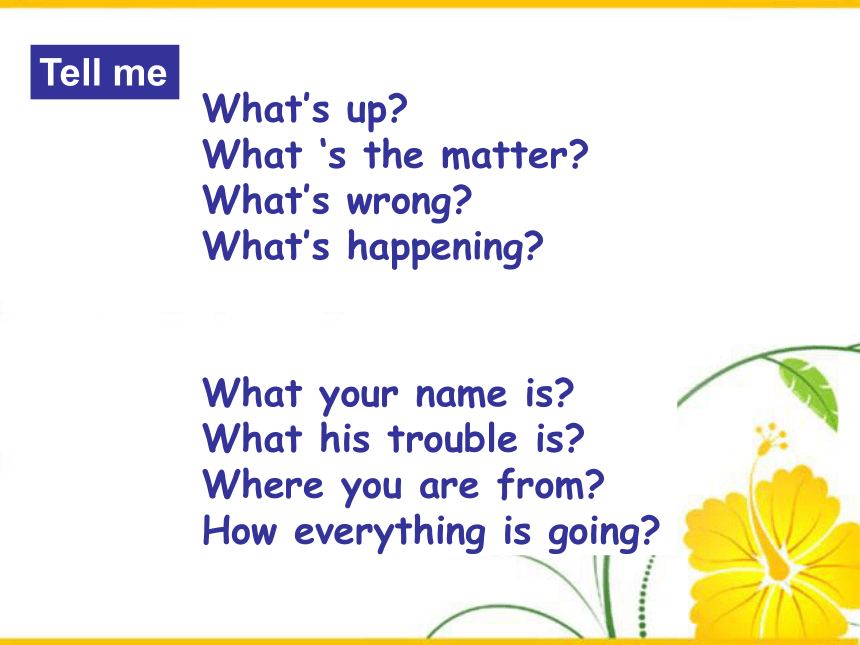
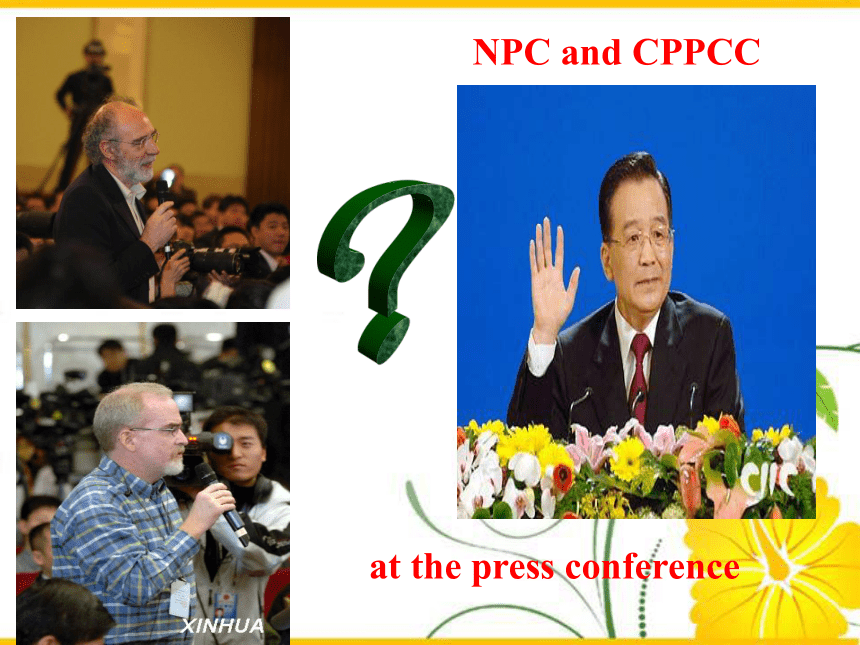
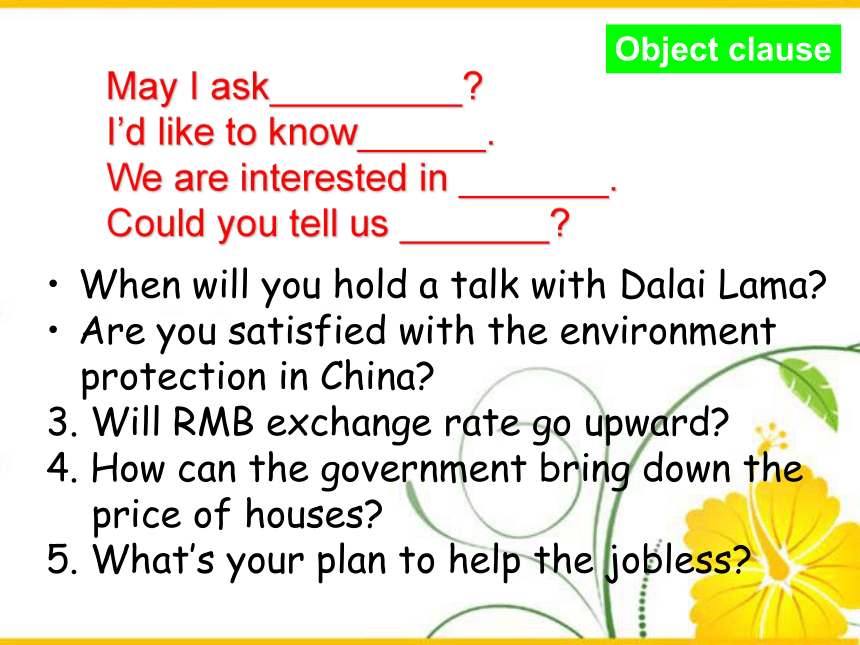
文档简介
(共28张PPT)
The
tongue
speaks
what
the
heart
thinks.
2.
Hold
what
you
really
know
and
tell
what
you
do
not
know–
this
will
lead
to
knowledge.
---
Confucius
3.
Experience
is
not
what
happens
to
you.
It’s
what
you
do
with
what
happens
to
you.
---Aldous
Huxley
言由心生
知之为知之,不知为不知,是知也。
所谓经历不是发生在你身上的事情,而是你怎样处理发生在你身上的事情。
Object
Clause
宾语从句
Predictive
Clause表语从句
M3U3
Grammar
He
gets
much
pleasure
out
of
the
meal.
The
holder
of
the
million
pound
banknote
is
in
rags.
He
doesn’t
have
any
change
on
him.
The
bank
has
issued
two
notes
in
this
amount.
Henry
tells
the
waiter
(that)
We
are
surprised
to
find
(that)
He
says(that)
The
newspaper
says
(that)
fact/truth
Does
the
hostess
scream
at
the
million
pound
banknote?
Can
you
break
the
banknote?
Is
the
banknote
genuine?
Can
he
pay
the
bill?
He
asks
I
wonder
They
doubt
They
ask
can
can
is
s
whether
if
if
whether
How
can
he
seek
help
from
the
embassy?
Why
is
Henry
wandering
on
the
pavement?
Where
is
Henry
from?
When
did
Mark
Twain
publish
Tom
Sawyer?
What
did
Henry
do
back
home
in
America?
What
will
happen
to
Henry?
Tell
me________
how
he
can
seek
help
from
the
embassy?
why
Henry
is
wandering
on
the
pavement?
where
Henry
is
from?
when
Mark
Twain
published
Tom
Sawyer?
what
Henry
did
back
home
in
America?
what
will
happen
to
Henry?
something
way
reason
place
time
job
It
was
my
sister
who
first
had
the
idea
of
cycling
from
the
origin
to
the
end
of
the
Mekong
River.
2.
He
went
back
to
his
birthplace
to
sweep
his
parents’
tombs.
3.
You
have
to
say
sorry
for
your
behavior.
4.
His
eyes
stare
at
the
leftovers
on
the
table.
where
it
begins
where
it
ends
where
he
was
born
what
you
have
done
what
is
left
something
Tell
me
What’s
up?
What
‘s
the
matter?
What’s
wrong?
What’s
happening?
What’s
your
name?
What’s
his
trouble?
Where
are
you
from?
How
is
everything
going?
What
your
name
is?
What
his
trouble
is?
Where
you
are
from?
How
everything
is
going?
?
at
the
press
conference
NPC
and
CPPCC
When
will
you
hold
a
talk
with
Dalai
Lama?
Are
you
satisfied
with
the
environment
protection
in
China?
3.
Will
RMB
exchange
rate
go
upward?
4.
How
can
the
government
bring
down
the
price
of
houses?
5.
What’s
your
plan
to
help
the
jobless?
May
I
ask_________?
I’d
like
to
know______.
We
are
interested
in
_______.
Could
you
tell
us
_______?
Object
clause
when
you
will
hold
a
talk
with
Dalai
Lama?
whether
you’re
satisfied
with
the
environment
protection
in
China?
whether
RMB
exchange
rate
will
go
upward?
how
the
government
can
bring
down
the
price
of
houses?
what
your
plan
to
help
the
jobless
is?
Predicative
clause
May
I
ask________?
I’d
like
to
know______.
We
are
interested
in
______.
Could
you
tell
us
______?
My
question
is________.
1.
A
computer
can
only
do
________________
(我们指示它做的事情)
to
do.(instruct)
2.
Mr
Brown
lives
about
a
dozen
blocks
away
from
________________________
(炸弹爆炸的地方).
(explode)
3.
The
bomb
exploded
not
far
from
____________________
(布朗先生住的地方).
(live)
4.Ten
years
ago
he
lived
in
_________________
(叫做格林威治的地方).
(Greenwich)
5.Tom
is
no
longer
____________________.
(他过去的样子)
(used
to)
what
we
instruct
it
what
is
called
Greenwich
where
the
bomb
exploded
where
Mr.
Brown
lives
what
he
used
to
be
Tom
is
no
longer
what
he
used
to
be.
The
question
is
which
of
us
should
come
first.
The
problem
is
who
is
really
fit
for
the
hard
job.
The
important
thing
is
whose
name
should
be
put
on
the
top
of
the
list.
That’s
where
I
can’t
agree
with
you.
This
is
why
Sara
was
late
for
the
meeting.
This
is
how
they
overcome
the
difficulties.
My
strongest
memory
is
when
I
attended
an
American
wedding.
I
know
him
.
2.
I
know
who
he
is
.
主语
谓语
宾语
(简单句)
主语
谓语
宾
语
从
句
连词
从句主语
从句谓语
主
句
(复合句)
什么是宾语?
I
know
him.
Do
you
have
the
time?
I
think
(that)
she
is
beautiful.
Why
don’t
you
pay
attention
to
me?
宾语
位于谓语动词或者介词后
特殊疑问句:
Who
is
he?
陈述句:He
is
a
student.
一般疑问句:Is
he
a
student?
Watch
陈述句作宾语引导词用————无词义,可以省略
that
he
is
a
student
He
says
_________________
(that)
一般疑问句作宾语,引导词用——————有词义,“是否”,不作句子成分
whether
(if)
he
is
a
student
I
ask
him
_________________
________
(语序不倒装)
whether
或if
I
don’t
know
_____________(语序不倒装)
who
he
is.
特殊疑问句作宾语,引导词用——————,必须作句子成分
特殊疑问词who,
which,
when,
whose
宾语从句中的否定转移
我认为他不会来这里
I
think
he
won’t
come
here.
(
)
I
don’t
think
he
will
come
here.
(
)
注意:如果宾语从句是由think,
believe,
imagine,
suppose等词引导的时候,要将从句中的否定形式转移到主句中去。
What’s
wrong?
What’s
the
matter?
What’s
happening?
What
happened?
注:当从句的原句为以下句子
以及what,
who作主语时,语序不变:
eg:
I
don’t
know
what’s
the
matter.
Can
you
tell
me
who
is
over
there?
Can
you
tell
me
who
he
is
?
做主语
做宾语
只能用
whether不能用
if
的情况
1.
在介词后面:
I’m
thinking
of
whether
we
should
go
fishing.
We
are
worried
about
whether
it
will
rain
tomorrow.
2.
在动词不定式前(whether
to
do
sth.)
:
They
asked
me
whether
to
go
skating.
3.当与or
not连用,或提出两种选择时:
I
don’t
know
whether
he’s
free
or
not.
Mary
asked
whether
I
was
doing
my
homework
or
not.
Tell
me
whether
you’d
like
to
go
shopping
or
tidy
the
room.
4.
宾语从句提前时:
Whether
this
is
true
or
not,
I
can’t
say.
Practice
time
if
/
whether
1.
I
asked
her
__________
she
had
a
bike.
2.
We’re
worried
about
________
he
is
safe.
3.
I
wonder
___________
he
is
well.
4.
I
don’t
know
________
or
not
he
is
well.
5.
I
don’t
know
_______
to
go.
if
/
whether
whether
whether
/if
whether
whether
1.
that
引导的表语从句
连接词that
仅起连接作用,无意义,在句中不作任何成分,通常不可省略。
e.g.
The
chance
is
that
one
smoker
in
four
will
die
from
smoking.
2.
whether
引导的表语从句
连接词whether起连接作用,
意为“是否、究竟、到底”(注意:if不能引导表语从句)
在句中也不作任何成分。
e.g.
The
question
is
whether
what
man
will
turn
up
in
time.
表语从句-在从句中作表语的从句称作表语从句。
其他连词as
if,
because,
as,
as
though
引导的表语从句
because引导表语从句通常只用于“This/That/It
is
because…”结构中。
as
if/though引导的表语从句常置于连系动词look,
seem,
sound,
be,
become等后面,常用虚拟语气,表示不存在的动作或状态。
e.g.
It
sounds
as
if/though
somebody
was
knocking
at
the
door.
e.g.
My
anger
is
because
you
haven’t
written
to
me
for
a
long
time.
It
is
because
he
was
careless.
That
is
because
he
often
came
late
for
school.
The
reason
for
his
absence
was
that
he
was
ill.
The
reason
why
he
didn't
hand
in
his
homework
was
that
he
didn't
finish
it
on
time.
用it作形式宾语的宾语从句
动词find,
feel,
think,
consider,
make,
believe等后有宾语补足语时,通常用形式宾语it替代,将that从句放在最后
I
feel
it
a
pity
that
I
haven't
been
to
the
party.
有些动词,如hate,
take,
owe,
have,
see
to
后带宾语从句时习惯在从句前加it
I
hate
it
when
they
talk
with
their
nouths
full
of
food.
that引导的从句作介词宾语,通常用形式宾语it替代,将that从句放在最后
You
may
depend
on
it
that
I
shall
always
help
you.
The
tongue
speaks
what
the
heart
thinks.
2.
Hold
what
you
really
know
and
tell
what
you
do
not
know–
this
will
lead
to
knowledge.
---
Confucius
3.
Experience
is
not
what
happens
to
you.
It’s
what
you
do
with
what
happens
to
you.
---Aldous
Huxley
言由心生
知之为知之,不知为不知,是知也。
所谓经历不是发生在你身上的事情,而是你怎样处理发生在你身上的事情。
Object
Clause
宾语从句
Predictive
Clause表语从句
M3U3
Grammar
He
gets
much
pleasure
out
of
the
meal.
The
holder
of
the
million
pound
banknote
is
in
rags.
He
doesn’t
have
any
change
on
him.
The
bank
has
issued
two
notes
in
this
amount.
Henry
tells
the
waiter
(that)
We
are
surprised
to
find
(that)
He
says(that)
The
newspaper
says
(that)
fact/truth
Does
the
hostess
scream
at
the
million
pound
banknote?
Can
you
break
the
banknote?
Is
the
banknote
genuine?
Can
he
pay
the
bill?
He
asks
I
wonder
They
doubt
They
ask
can
can
is
s
whether
if
if
whether
How
can
he
seek
help
from
the
embassy?
Why
is
Henry
wandering
on
the
pavement?
Where
is
Henry
from?
When
did
Mark
Twain
publish
Tom
Sawyer?
What
did
Henry
do
back
home
in
America?
What
will
happen
to
Henry?
Tell
me________
how
he
can
seek
help
from
the
embassy?
why
Henry
is
wandering
on
the
pavement?
where
Henry
is
from?
when
Mark
Twain
published
Tom
Sawyer?
what
Henry
did
back
home
in
America?
what
will
happen
to
Henry?
something
way
reason
place
time
job
It
was
my
sister
who
first
had
the
idea
of
cycling
from
the
origin
to
the
end
of
the
Mekong
River.
2.
He
went
back
to
his
birthplace
to
sweep
his
parents’
tombs.
3.
You
have
to
say
sorry
for
your
behavior.
4.
His
eyes
stare
at
the
leftovers
on
the
table.
where
it
begins
where
it
ends
where
he
was
born
what
you
have
done
what
is
left
something
Tell
me
What’s
up?
What
‘s
the
matter?
What’s
wrong?
What’s
happening?
What’s
your
name?
What’s
his
trouble?
Where
are
you
from?
How
is
everything
going?
What
your
name
is?
What
his
trouble
is?
Where
you
are
from?
How
everything
is
going?
?
at
the
press
conference
NPC
and
CPPCC
When
will
you
hold
a
talk
with
Dalai
Lama?
Are
you
satisfied
with
the
environment
protection
in
China?
3.
Will
RMB
exchange
rate
go
upward?
4.
How
can
the
government
bring
down
the
price
of
houses?
5.
What’s
your
plan
to
help
the
jobless?
May
I
ask_________?
I’d
like
to
know______.
We
are
interested
in
_______.
Could
you
tell
us
_______?
Object
clause
when
you
will
hold
a
talk
with
Dalai
Lama?
whether
you’re
satisfied
with
the
environment
protection
in
China?
whether
RMB
exchange
rate
will
go
upward?
how
the
government
can
bring
down
the
price
of
houses?
what
your
plan
to
help
the
jobless
is?
Predicative
clause
May
I
ask________?
I’d
like
to
know______.
We
are
interested
in
______.
Could
you
tell
us
______?
My
question
is________.
1.
A
computer
can
only
do
________________
(我们指示它做的事情)
to
do.(instruct)
2.
Mr
Brown
lives
about
a
dozen
blocks
away
from
________________________
(炸弹爆炸的地方).
(explode)
3.
The
bomb
exploded
not
far
from
____________________
(布朗先生住的地方).
(live)
4.Ten
years
ago
he
lived
in
_________________
(叫做格林威治的地方).
(Greenwich)
5.Tom
is
no
longer
____________________.
(他过去的样子)
(used
to)
what
we
instruct
it
what
is
called
Greenwich
where
the
bomb
exploded
where
Mr.
Brown
lives
what
he
used
to
be
Tom
is
no
longer
what
he
used
to
be.
The
question
is
which
of
us
should
come
first.
The
problem
is
who
is
really
fit
for
the
hard
job.
The
important
thing
is
whose
name
should
be
put
on
the
top
of
the
list.
That’s
where
I
can’t
agree
with
you.
This
is
why
Sara
was
late
for
the
meeting.
This
is
how
they
overcome
the
difficulties.
My
strongest
memory
is
when
I
attended
an
American
wedding.
I
know
him
.
2.
I
know
who
he
is
.
主语
谓语
宾语
(简单句)
主语
谓语
宾
语
从
句
连词
从句主语
从句谓语
主
句
(复合句)
什么是宾语?
I
know
him.
Do
you
have
the
time?
I
think
(that)
she
is
beautiful.
Why
don’t
you
pay
attention
to
me?
宾语
位于谓语动词或者介词后
特殊疑问句:
Who
is
he?
陈述句:He
is
a
student.
一般疑问句:Is
he
a
student?
Watch
陈述句作宾语引导词用————无词义,可以省略
that
he
is
a
student
He
says
_________________
(that)
一般疑问句作宾语,引导词用——————有词义,“是否”,不作句子成分
whether
(if)
he
is
a
student
I
ask
him
_________________
________
(语序不倒装)
whether
或if
I
don’t
know
_____________(语序不倒装)
who
he
is.
特殊疑问句作宾语,引导词用——————,必须作句子成分
特殊疑问词who,
which,
when,
whose
宾语从句中的否定转移
我认为他不会来这里
I
think
he
won’t
come
here.
(
)
I
don’t
think
he
will
come
here.
(
)
注意:如果宾语从句是由think,
believe,
imagine,
suppose等词引导的时候,要将从句中的否定形式转移到主句中去。
What’s
wrong?
What’s
the
matter?
What’s
happening?
What
happened?
注:当从句的原句为以下句子
以及what,
who作主语时,语序不变:
eg:
I
don’t
know
what’s
the
matter.
Can
you
tell
me
who
is
over
there?
Can
you
tell
me
who
he
is
?
做主语
做宾语
只能用
whether不能用
if
的情况
1.
在介词后面:
I’m
thinking
of
whether
we
should
go
fishing.
We
are
worried
about
whether
it
will
rain
tomorrow.
2.
在动词不定式前(whether
to
do
sth.)
:
They
asked
me
whether
to
go
skating.
3.当与or
not连用,或提出两种选择时:
I
don’t
know
whether
he’s
free
or
not.
Mary
asked
whether
I
was
doing
my
homework
or
not.
Tell
me
whether
you’d
like
to
go
shopping
or
tidy
the
room.
4.
宾语从句提前时:
Whether
this
is
true
or
not,
I
can’t
say.
Practice
time
if
/
whether
1.
I
asked
her
__________
she
had
a
bike.
2.
We’re
worried
about
________
he
is
safe.
3.
I
wonder
___________
he
is
well.
4.
I
don’t
know
________
or
not
he
is
well.
5.
I
don’t
know
_______
to
go.
if
/
whether
whether
whether
/if
whether
whether
1.
that
引导的表语从句
连接词that
仅起连接作用,无意义,在句中不作任何成分,通常不可省略。
e.g.
The
chance
is
that
one
smoker
in
four
will
die
from
smoking.
2.
whether
引导的表语从句
连接词whether起连接作用,
意为“是否、究竟、到底”(注意:if不能引导表语从句)
在句中也不作任何成分。
e.g.
The
question
is
whether
what
man
will
turn
up
in
time.
表语从句-在从句中作表语的从句称作表语从句。
其他连词as
if,
because,
as,
as
though
引导的表语从句
because引导表语从句通常只用于“This/That/It
is
because…”结构中。
as
if/though引导的表语从句常置于连系动词look,
seem,
sound,
be,
become等后面,常用虚拟语气,表示不存在的动作或状态。
e.g.
It
sounds
as
if/though
somebody
was
knocking
at
the
door.
e.g.
My
anger
is
because
you
haven’t
written
to
me
for
a
long
time.
It
is
because
he
was
careless.
That
is
because
he
often
came
late
for
school.
The
reason
for
his
absence
was
that
he
was
ill.
The
reason
why
he
didn't
hand
in
his
homework
was
that
he
didn't
finish
it
on
time.
用it作形式宾语的宾语从句
动词find,
feel,
think,
consider,
make,
believe等后有宾语补足语时,通常用形式宾语it替代,将that从句放在最后
I
feel
it
a
pity
that
I
haven't
been
to
the
party.
有些动词,如hate,
take,
owe,
have,
see
to
后带宾语从句时习惯在从句前加it
I
hate
it
when
they
talk
with
their
nouths
full
of
food.
that引导的从句作介词宾语,通常用形式宾语it替代,将that从句放在最后
You
may
depend
on
it
that
I
shall
always
help
you.
同课章节目录
